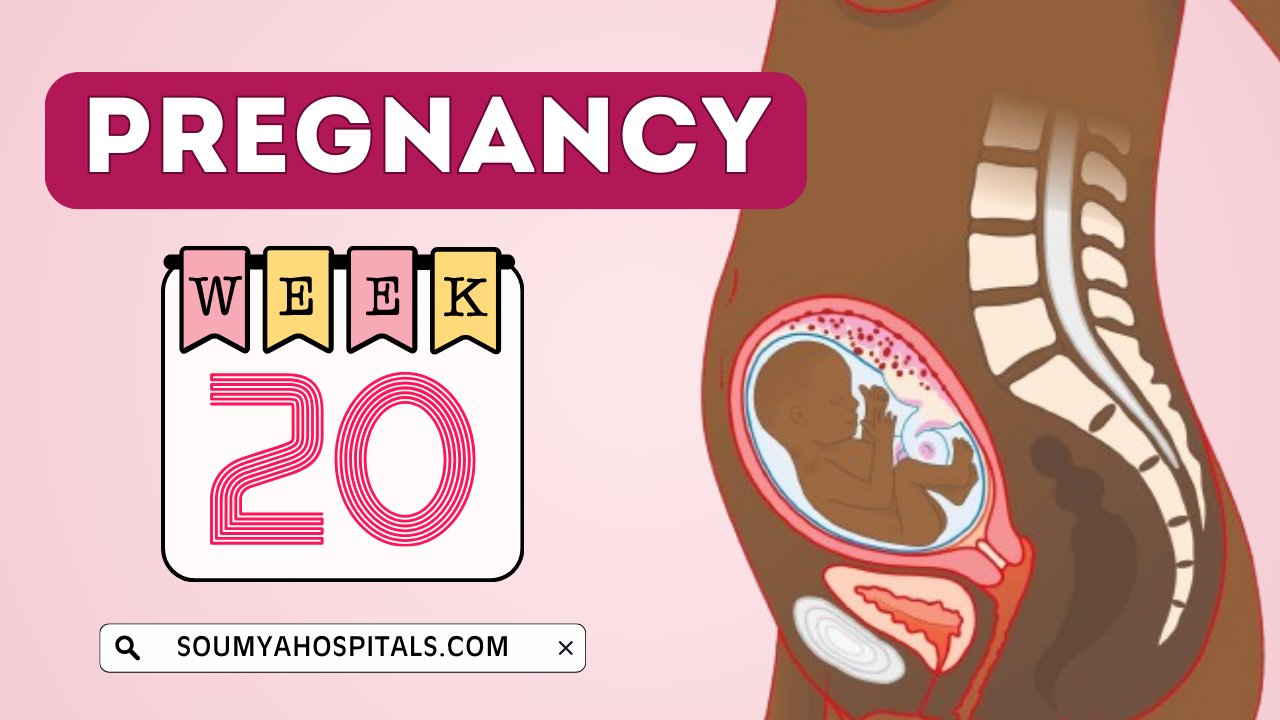You have reached 20 weeks already which means half of the pregnancy journey is completed. Congratulations!! Knowing about week by week in pregnancy can help you know how your baby grows, the pregnancy diet plan and many more.
Now you are in 20 weeks, which means your baby is getting bigger in the womb. From head to toe, the baby measures about 25.6 cm. Your baby is starting to swallow. They will drink in small quantities of amniotic fluid.
Learn About: 19 Weeks Pregnant
Go through this complete article to learn about the pregnancy symptoms, signs, what to expect during 20 weeks of pregnancy, and how your baby is doing in week 20 as everything is explained clearly.
- Highlights of 20 Weeks Pregnant
- Your Fetus Developments at 20 Weeks
- 20 Weeks Pregnancy Symptoms
- What Mom's To Be Can Do at 20 Weeks Pregnant?
- Things to Remember During Week 20 Pregnant
- Best Diet Plan at 20 Weeks Pregnancy
- Does 20 weeks mean 5 months?
- Will I feel my baby at 20 weeks?
- What position is the baby in womb at week 20?
- How should I be feeling at 20 weeks pregnant?
Highlights of 20 Weeks Pregnant
- Congratulations - you have officially made it to the halfway point of pregnancy! It might feel like time is crawling or time is flying; it depends on how you’re feeling and coping with all the changes happening to you and around you.
- The anatomy scan—or 20-week ultrasound—will be happening soon! Yes, you can find out the baby’s sex at this appointment (if you want). More importantly, an ultrasound tech will look at the baby’s organs, take measurements and assess that the baby is developing appropriately.
- Your healthcare provider will probably start measuring your fundal height soon. Essentially, they’ll measure your bump which is starting to pop!
- You have probably gained about 10 pounds—give or take—now. Don’t get too caught up in the number; ensure you’re eating a healthy, balanced diet and getting some movement!
Learn About: 21 Weeks Pregnant
Your Fetus Developments at 20 Weeks
Your baby is growing fast. Here is what you can expect in this week.
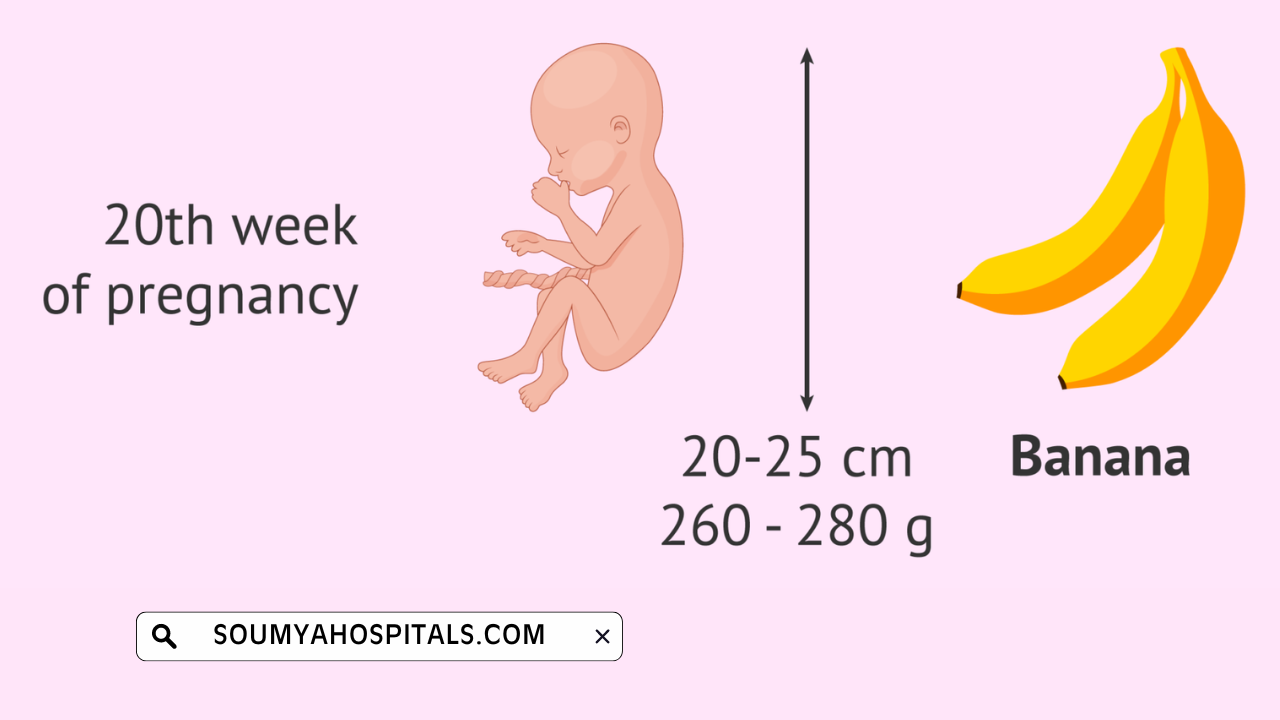
Your baby’s facial features are developing including the nose that takes shape.
Your baby is in the process of developing a definite sleep-wake cycle and is also becoming responsive to sounds in the environment. From time to time, loud noises may even wake him.
Your little one's sucking reflex is coming along, and he may suck his thumb this week or sometime soon. Rapid brain growth continues, particularly in the nerve centres dedicated to the senses.
Around this time your baby’s skin is thickening and layers of skin are forming as well. The skin is protected from the amniotic fluid by a waxy coating called vernix.
When you are around 20 weeks pregnant, your baby’s digestive system starts to produce a greenish-black, sticky substance called meconium, which will accumulate in his bowels over the rest of the pregnancy. Typically, your baby will pass this substance after he’s born, and you’ll see it in your baby’s first few diapers.
Besides the rolling, diving, and kicking, you might also feel the rhythmic jerking of the baby during this week of pregnancy. Most babies get hiccups in the uterus, possibly due to an immature diaphragm having spasms. No need to worry though — they're not causing him any harm.
The size of the 20-week-old baby is around the size of a bell pepper. By this time, your fetus may weigh about 0.2 to 0.3 kgs and is over 6 inches long.
20 Weeks Pregnancy Symptoms
At Week 20 Pregnancy, these are some of the symptoms you may be experiencing:
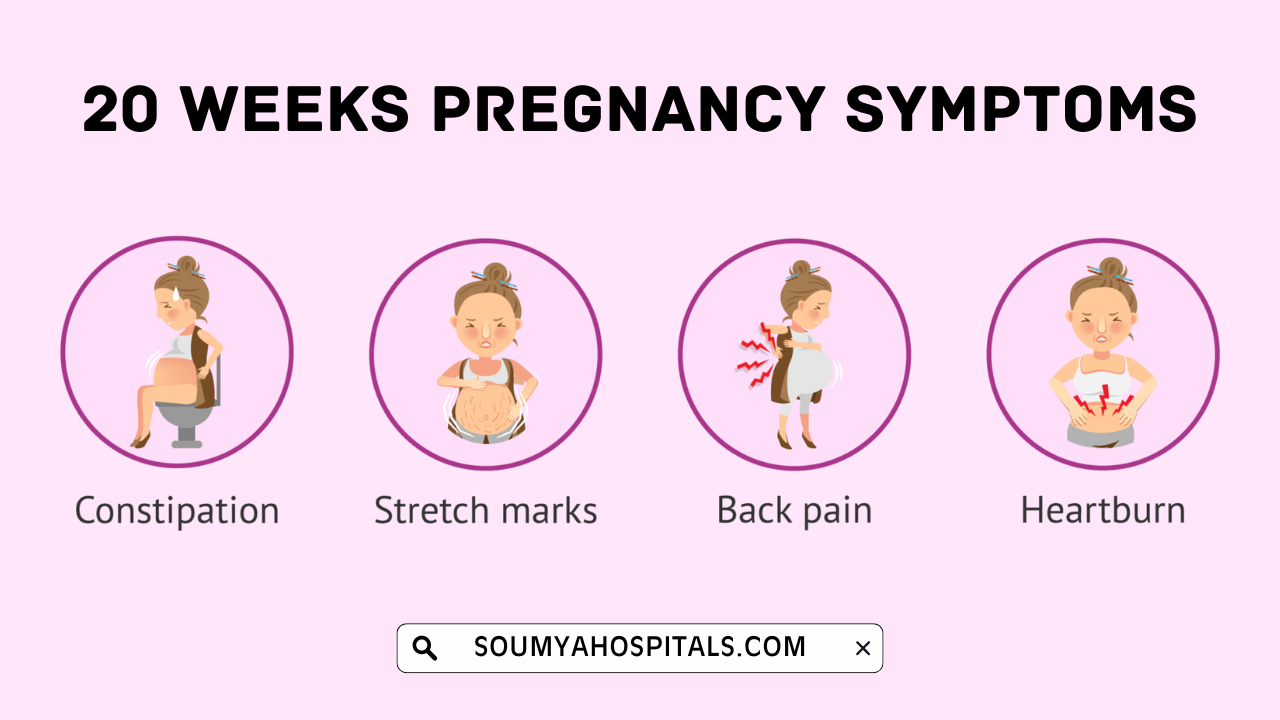
As your belly grows, you might find your back hurting, particularly toward the end of the day. There are a few things you can do to prevent or ease this discomfort, including wearing low-heeled shoes (not high heels but not completely flat shoes either), doing gentle exercise that helps stretch and strengthen your back muscles, and wearing a belly support band.
Increased levels of hormones and extra blood volume during pregnancy can make the mucous membranes in your nose swell and dry out. This can lead to both congestion and nosebleeds. It's helpful to use a humidifier to moisten the air and to drink lots of water to stay hydrated.
Hormonal activity and your growing baby pushing against your intestines can lead to constipation. Although this condition can be uncomfortable, drinking more water and eating more fibre can help get things moving.
You may be having a hard time concentrating, and you may find that you’re forgetting small things. It might help to create checklists or reminders (on paper, sticky notes, or your phone), and to give yourself some extra breaks while doing tasks that require your concentration.
This condition can be caused by pregnancy weight gain and fluid retention, but a hormone called relaxin also contributes. This hormone relaxes ligaments and joints to help make it easier for your baby to pass through the pelvis during birth, but relaxin also loosens the ligaments elsewhere in your body — including those in your feet, causing them to spread.
To help you feel more comfortable, you may need to go up a shoe size; also, try propping your feet up on a pillow or footrest as often as you can.
You may find yourself shifting positions around the night until you are in a comfortable sleep position. To avoid restlessness, try lying on your left side with your knees bent. Place a pillow between your legs for comfort. For additional support, you can place extra pillows behind your back and under your belly.
You may have started feeling a little cramped. This is because the top of your uterus is now in the level of your belly button, as you have gained four-five kgs. You can expect to put on another kg or so every week from now on. To understand the ideal pregnancy weight, talk to your doctor and see if you're on track.
The skin around your belly and breasts may feel itchy as it stretches to accommodate your little one. Apply moisturiser or cold packs on the itchy area for relief. Avoid scratching, as it can make the discomfort worse.
Due to the increase in the hormones, you can expect an increase in the discharge until delivery. However, in case you notice any unusual discharge that's yellow or green with a foul smell, do let your doctor know.
What Mom's To Be Can Do at 20 Weeks Pregnant?
If you are a working woman, you may start to find the commute more difficult as your baby bump gets bigger. You can take steps to make it easier for yourself:
- Keep snacks and water with you at all times.
- Try to change your hours so you travel out of peak traffic and crowds.
- Wear comfortable shoes if you’re using public transport to protect your feet and back from the exertion of standing for long. And don’t hesitate to ask for a seat!
- Keep a pollution mask in your bag to wear on days when pollution levels are high. It will protect you and your growing baby from the effects of pollution.
- Carry a foldable umbrella in your bag to shield you from the sun or rain if you often need to step out.
If you use a two-wheeler for transportation to the workplace, then it's time to choose alternatives. Your growing belly changes your centre of gravity and can make you unstable on a two-wheeler.
And, now that you’re half way through, your regular clothes might be getting a bit tight. If you haven’t gotten any maternity wear yet, now might be the time to do a bit of shopping.
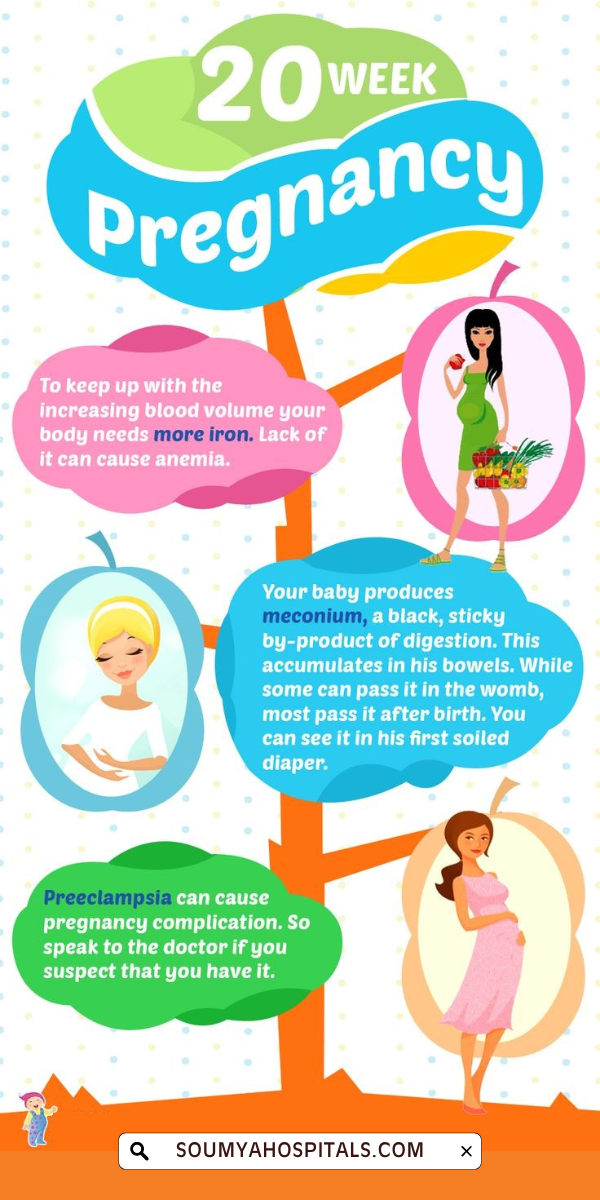
Things to Remember During Week 20 Pregnant
As you reach halfway through the second trimester, here are some tips for you to consider:
Book Your Ultrasound Appointment
Your doctor may recommend an ultrasound exam at around 18 to 20 weeks of pregnancy. This ultrasound helps her confirm that everything is progressing well, including the size and position of your baby, and checking that the bones and organs that are visible are developing well.
In addition, during this scan your doctor can get an estimate of your baby’s gestational age and weight, detect his movement and heartrate, see the position of the placenta, and check the amount of amniotic fluid. Ask your doctor for advice if you have any questions about the ultrasound.
The second trimester is usually a good time to travel, as your pregnancy symptoms may be a little less intense and your belly is probably not so big yet that it’s uncomfortable getting around. Still, there are a few things to keep in mind if you’re planning to get away. Don’t commit yourself to a rigid schedule or plan too many activities. Be prepared to change your itinerary at the last minute based on how you’re feeling.
If you’re thinking of flying, check with your doctor and the airline. Although most airlines allow pregnant women to fly until about 36 weeks, each airline has its own policies. Whether you travel by bus, train, car, or plane, try to take breaks and get up and walk around regularly, stay hydrated, eat regularly to boost your energy, and have a copy of your health records with you. It’s a good idea to get a prenatal check-up before you leave, to make sure everything is OK.
There are many things you can do to help your partner experience more of your pregnancy along with you. For example, go together to the check-ups and ultrasounds, and share the fun (and the work) of decorating the nursery. You could even go to childbirth classes together so your partner knows more about what you’ll experience during labour and delivery, and how you can both prepare for the big day. These classes offer a chance to meet other parents, too.
Choose a Hospital for Delivery
If you haven't decided where you will be giving birth, you can start searching for hospitals or nursing homes at this point. Take a tour to the hospital and enquire about the facilities and policies.
Best Diet Plan at 20 Weeks Pregnancy
Many expecting mums get constipated. This happens because digestion slows down during pregnancy. But you can take steps to treat constipation naturally.
A diet rich in fibre can help move things along your bowels. Eat plenty of wholegrain cereals, lentils, beans, brown rice and fruit and vegetables.
You'll also need to drink more fluid. Without enough water, fibre-rich foods can cause bloating. They can also bulk up your stools making constipation worse.
Don’t have too much bran (chokar) when you’re looking for ways to up your fibre intake. Bran can sometimes make it harder for your body to absorb nutrients from your food.
Avoid any drinks that make you pass urine more often such as tea, coffee, and cola. These drinks drain the water from your body and can make the constipation worse.
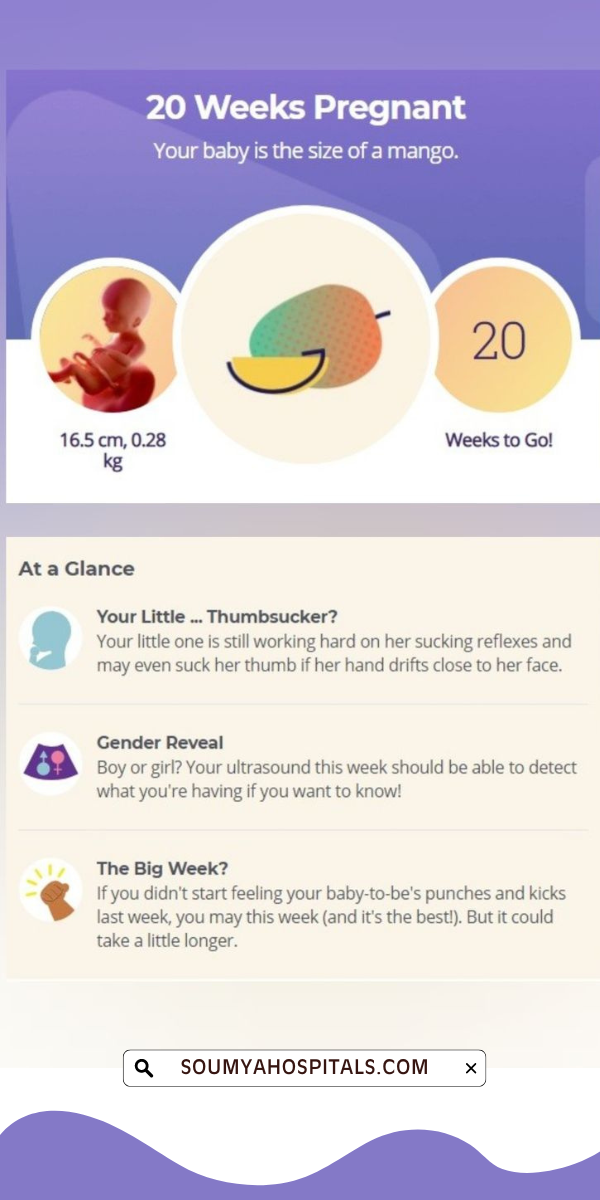
FAQs on 20 Weeks Pregnant
1. Does 20 weeks mean 5 months?
Yes, 20 weeks pregnant means you are in 5th month of your pregnancy.
2. Will I feel my baby at 20 weeks?
Yes, you will start feeling your baby at 20 weeks. But many moms-to-be can't find those early fetal movements.
3. What position is the baby in womb at week 20?
Your baby is making a place for the uterus to expand towards your belly button, giving baby room to wiggle around. They still have much time to get into the head-down birth position, which doesn't occur until the third trimester.
4. How should I be feeling at 20 weeks pregnant?
At 20 weeks, you may have signs like back pain, stretch marks, tiredness and sleeping issues.
Conclusion
In the complete journey of a woman’s pregnancy week 20 is the crucial time and needs to take more rest. And this is the week when you know the baby gender and organs formation status through ultrasound.
Check out the week-by-week guide during pregnancy at Soumyahospitals website and also look at the tests during pregnancy. It is the perfect resource for new and expecting moms.
